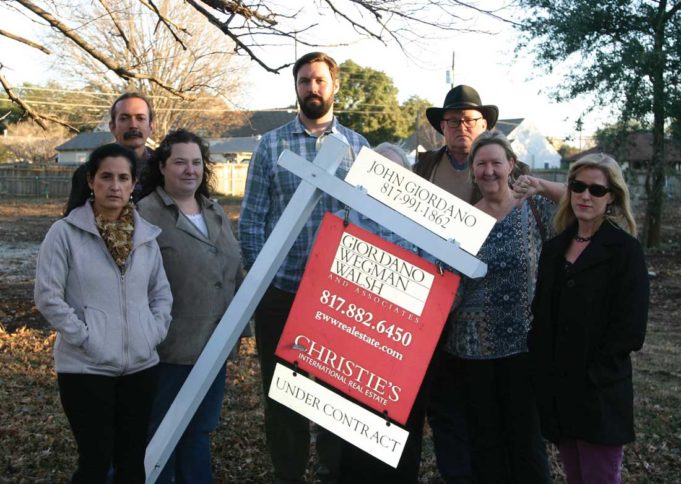People living near TCU are receiving an education without paying tuition, learning how building permits can overpower good intentions and compromise is tougher than trigonometry.
The single-family homes along Shirley Avenue in the University West neighborhood are nice but mostly older and on the small side. Still, they fetch prices in the hundreds of thousands of dollars because of their close proximity to the college. Several professors own homes on the street and walk past large shady trees to their classrooms. The mixture of young professionals, empty nesters, and retirees patiently –– and sometimes not so patiently –– endures the smattering of students living in the rental houses mixed among them.
“They are noisy, they get drunk, they leave beer bottles and red Solo cups in the yard,” said David Aftandlilian, who bought a house in the 2500 block with his wife, Sarah Rose, in 2009. Aftandlilian is a TCU professor who otherwise enjoys living in the cozy neighborhood and being able to attend classes, meetings, and campus events without driving his car.
Students moved next door to Martha Moxon a couple of years ago, and noise became maddening for her some nights after 2 a.m. when students would leave bars and move the party back to Shirley Avenue. And she noticed the rowdy renters made a habit of using her water hose during the day while she was gone. Sometimes, they neglected to turn off the tap, with water running down the curb for hours.
“I had to put a lock on that faucet to keep them from using it,” she said.
Dan McKenzie, who chairs the University West Neighborhood Association, has come home from work to find used condoms, beer cans, and whiskey bottles in his swimming pool.
“People would jump the fence and use my pool when I was not home,” he said
A view from his house shows a back alley where students urinate during parties.
“I’ve called the police quite a few times,” McKenzie said. “They know me on a first-name basis. The key is, when you get students congregating and mix in alcohol, bad things are going to happen.”
Sometimes, Lisa Vanderlinden, a professor who owns a house on Shirley Avenue, sees flames leaping above her 9-foot tall privacy fence when her young neighbors build illegal backyard bonfires. A swing that Vanderlinden placed in her front yard for her 9-year-old daughter to enjoy sometimes becomes a late-night crash pad or make-out perch for students, who leave empty beer cans and plastic cups lying in her grass. She resolves most of the issues by contacting the students directly rather than calling police.
“They’re nice kids and make good decisions a lot of the time, but they’re young,” she said. “I love my students. I spend a lot of time with these kids and try to support them in multiple ways. As their neighbor, I try to do the same thing.”
That support stretches only so far before splintering into frustration. Many homeowners hit their breaking points after recently learning that a local homebuilder is using four razed lots to build a collection of duplexes that could hold 32 people or more in the 2500 block adjacent to Aftandlilian and Rose.
The surrounding neighbors use a familiar term to describe the development: stealth dorms or residences in historically single-family neighborhoods that maximize occupancy rates and serve as de facto student housing.
“If you look at their floor plans, it is very clear they are designed to attract students,” homeowner Doreen Stevens said.
Not so, say the builders.
In 2000, three longtime locals – Rob Cocahower, John Giordano, and Karl Hahnfeld – founded HGC Development, and the company website touts “a passion for making Fort Worth a better community one home at a time.” The company mission is described as transforming “a homeowner’s dream into a one-of-a-kind home of distinction and grace built with the utmost care and attention to detail.”
On Shirley Avenue, HGC plans to build “high-end duplexes marketed to empty-nesters, TCU alumni, and sophisticated buyers looking for a lock-and-leave residence with proximity to TCU, Colonial Country Club, the Fort Worth Zoo and the exquisite restaurants and shops of University Village,” said spokesperson Lori Engle via email.
Luxury duplexes with four bedrooms will be marketed at around $225 per square foot, putting them in the $650,000 range, she said. Eight duplexes are being built on 50-foot-wide lots with alley access to two-car garages in back. Driveways with parking spaces won’t be built on the front yards.
“The homes are designed to fit into the neighborhood and are a mix of classical, Tudor, and Mediterranean architecture,” Engle wrote.
The company followed the city’s rules, she said.
“Prior to the design of the duplexes, the developer consulted with the city multiple times to assure that what was being designed and built was permissible,” she said.
How do the neighbors disagree with HGC’s characterization of the facts? Let the neighbors count the ways through gritted teeth.
The designs don’t reflect the needs of empty nesters, the neighbors claimed. Most of the bedrooms are clustered upstairs, each with their own bathroom.
“I’m an empty nester,” Stevens said. “I would not buy a house that had three bedrooms and three bathrooms upstairs. That’s disingenuous to claim they are not going to be stealth dorms.”
A narrow alley with utility poles and a single entrance, along with two-car garages in duplexes potentially housing twice as many tenants, will encourage parking out front on the already congested Shirley Avenue. Typically, curbside parking is hard to find, especially during the day when a nearby public school is open and parking is prohibited on the west side of the street.
HGC’s plans were properly permitted, but the company’s actions were exploitative and shady, neighbors said. Many neighborhoods around TCU and the rest of the city were zoned to allow duplexes during the post-war baby booming era. In recent years, neighborhoods have sought with success to change zoning to single-family homes only. Earlier this year, the Shirley Avenue neighbors spent months seeking just such a change. Their efforts worked. On Dec. 4, City Council approved a zoning change from B (allowing two-family housing) to A-5 (one-family only). The change takes effect in 2019.
HGC, however, received its permits sooner.
“Just before we submitted our application to the city for this street, these lots sold, and [HGC] submitted permits to build four huge duplexes,” McKenzie said.
Over the years, we have written numerous stories about sleepy single-family neighborhoods near TCU transforming into animal houses for students (“Student Scourge,” Oct. 14, 2015).
“We’ve all seen how the student duplexes have destroyed other neighborhoods near TCU,” Aftandlilian said.
Real estate investors and builders relied on B zoning to plop duplexes with multiple bedrooms into neighborhoods geared toward families. In 2014, complaints from residents prompted city officials to create a zoning overlay near TCU to curtail the stealth dorms. Some nearby neighborhoods, including Shirley Avenue, were not included in the original overlay but are now seeking similar zoning protections.
HGC is “taking full advantage of all the idiosyncrasies and cracks in the city code” to put four 6,000-square-foot structures on four lots “whereas most houses on this block are 1,500 to 2,000 square feet,” McKenzie said.
The builders are legally permitted but morally deficient if they force a stealth dorm, luxury or not, down the neighborhood’s throat, Stevens said.
“It’s not a question of what’s legal or anyone breaking rules,” she said. “It’s a question of wanting this company and these individuals who are prominent in Fort Worth to do the right thing. They can make a nice little profit building four single-family homes on those four lots instead of four eight-bedroom structures.
“They could enhance the neighborhood instead of ruining the quality of life for everybody on the block,” she continued. “The plea is that they do the right thing for Fort Worth. It’s clear with the changes that have been occurring over the last several years, there is a real process of wanting to limit stealth dorms. It’s clear these are stealth dorms. It’s going against the will of the neighborhood.”













A neighborhood that failed to notice the gasping canary in the nearby Frisco Heights neighborhood